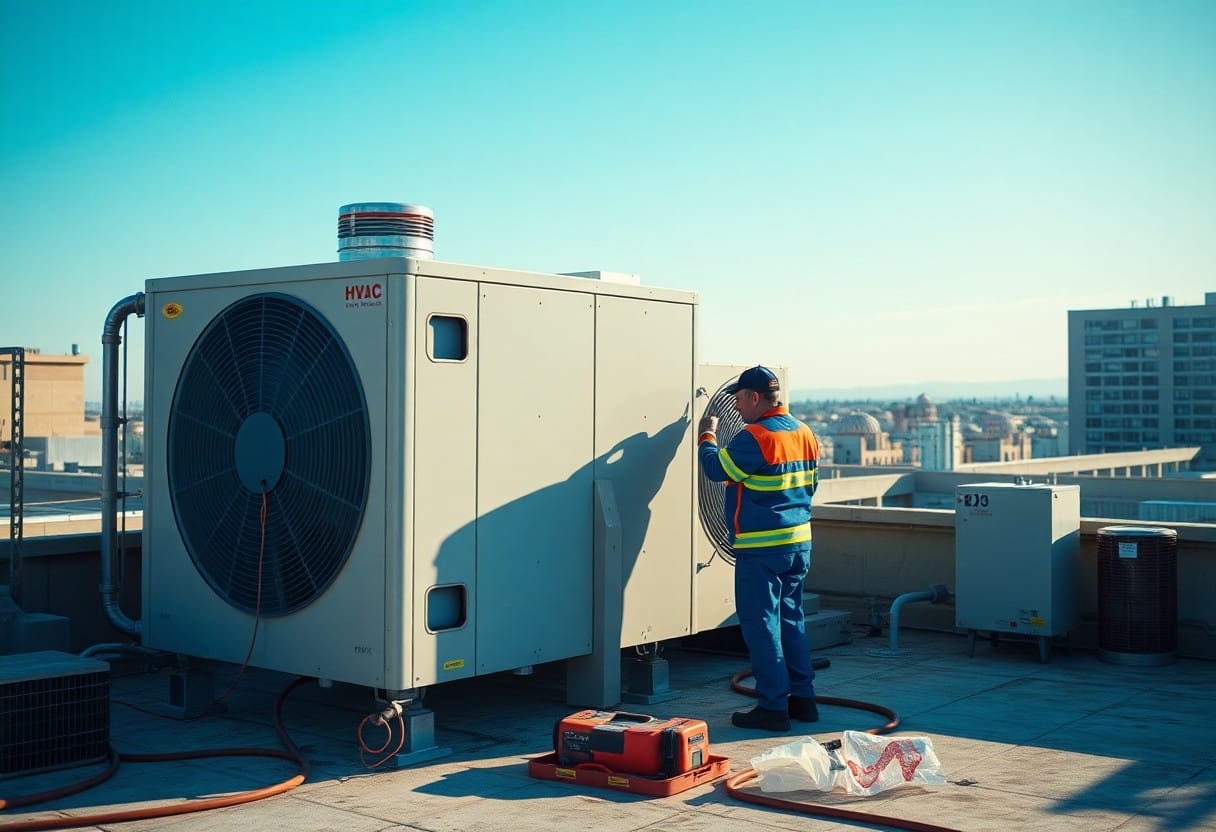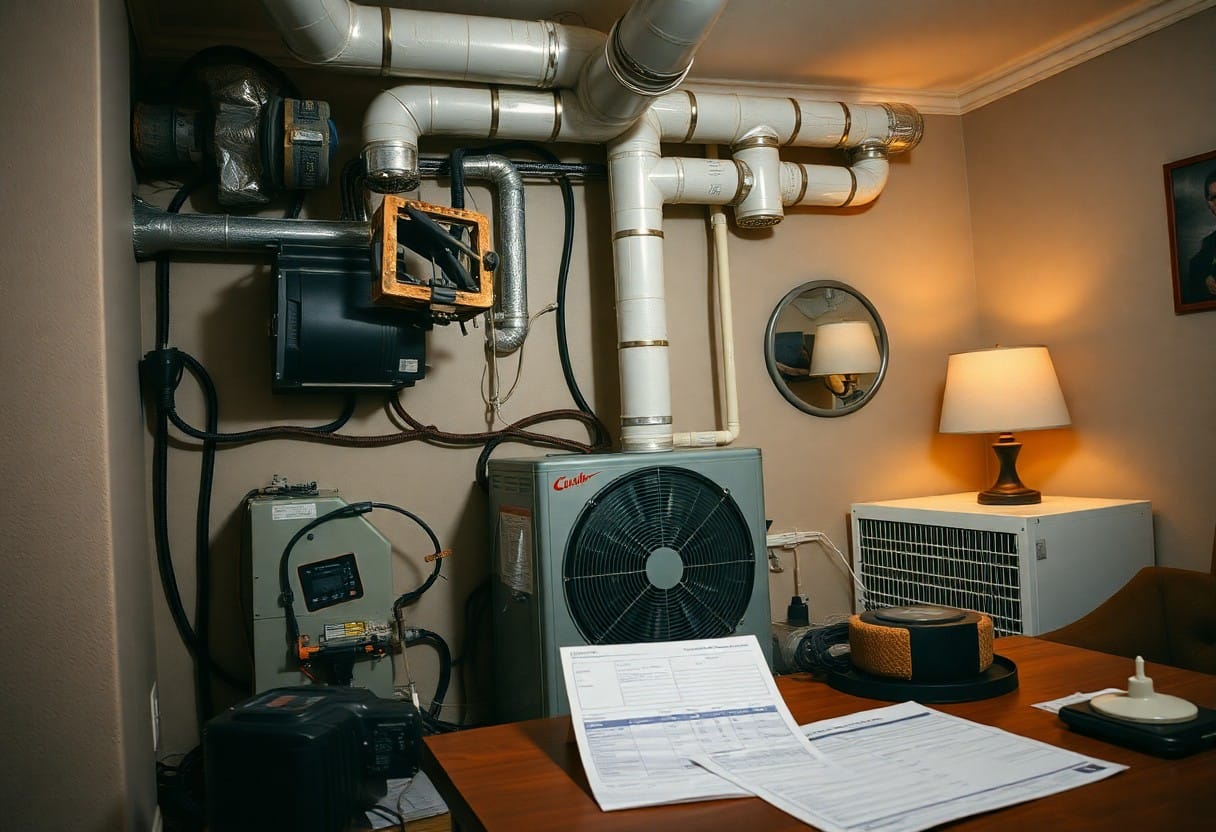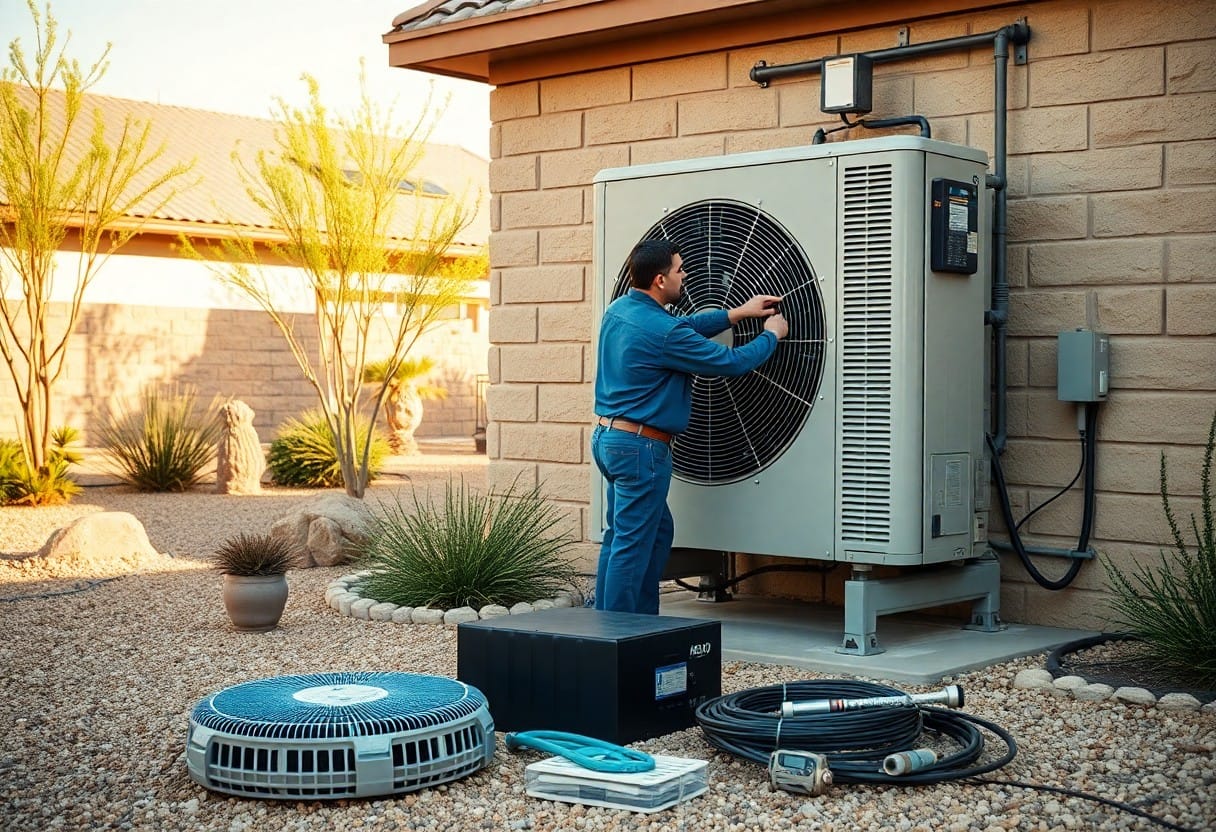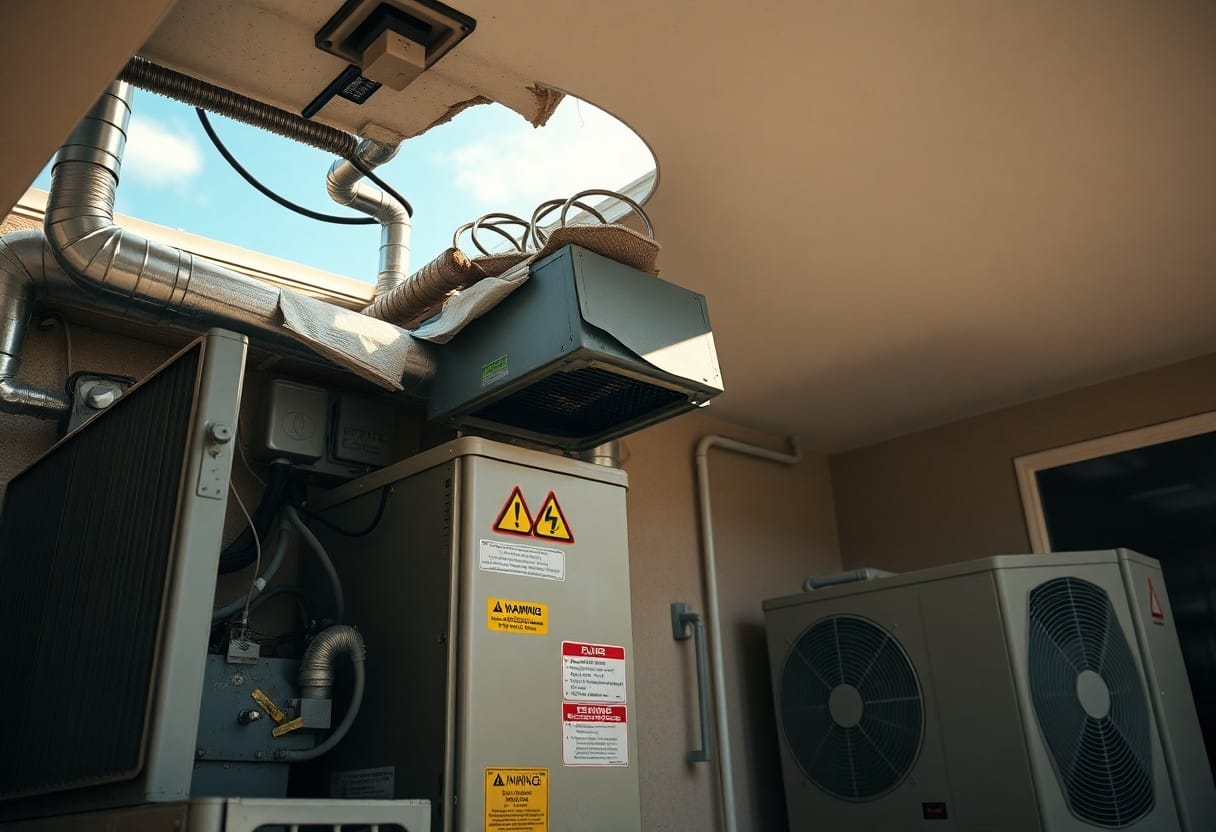Just when you need comfort the most, a total HVAC system failure can leave you feeling overwhelmed. In the sweltering heat of Phoenix, quick action is imperative to protect your home and health. This guide will equip you with the necessary information on emergency replacement options that ensure a swift resolution, allowing you to restore the comfort in your living space without delay.
With the extreme temperatures in Phoenix, experiencing a total HVAC system failure can be a dire situation for you and your home. When your heating and cooling system breaks down unexpectedly, it can leave you uncomfortable and seeking immediate solutions. Understanding your emergency replacement options is important, as timely action can restore your home’s comfort while ensuring you select a reliable system that meets your needs. This blog post will guide you through the necessary steps to take and the options available for a seamless transition during this challenging time.
Understanding Total HVAC System Failures
Common Causes
A total HVAC system failure can stem from a variety of issues that often develop over time. Neglect of routine maintenance is a leading contributor, as dirt, debris, and wear can lead to excessive strain on system components. Other frequent causes include malfunctioning thermostats, compressor failures, and refrigerant leaks that disrupt the cooling cycle, leaving your home uncomfortably hot.
Aging equipment also plays a significant role. Many HVAC systems are designed to last around 15-20 years; beyond this timeframe, components may not function optimally, increasing the likelihood of breakdowns. In Phoenix’s harsh climate, prolonged exposure to extreme temperatures can accelerate wear, requiring an urgent replacement when failure occurs.
Signs of Failure
Recognizing the signs of an impending total HVAC failure can save you from uncomfortable and costly situations. If your system produces strange noises—such as grinding, rattling, or hissing—it may indicate serious issues. Ineffective cooling, accompanied by fluctuating temperatures, suggests the system is struggling to keep up with demands, often pointing to underlying mechanical failures.
Additionally, frequent cycling on and off, known as short-cycling, often indicates problems with the thermostat or the compressor. If you notice an unexpected increase in energy bills, it could be a sign your HVAC system is working harder than it should to maintain comfortable temperatures, signaling an imminent failure.
In some cases, you might also observe an unusual buildup of moisture or leaking around the unit, which can lead to further complications like mold or structural damage. Addressing these signs promptly can often mitigate more significant issues and extend your system’s lifespan, making it important to stay alert to these warning indicators.
Understanding Total HVAC System Failures
Causes of System Failures
Total HVAC system failures can result from a variety of factors that compromise components over time. Common causes include lack of maintenance, which leads to clogged filters, dirty coils, and worn-out parts that strain the system. Additionally, extreme weather conditions in Phoenix, such as high temperatures and dust storms, can accelerate wear and tear. In some cases, electrical issues or improper installations can also be significant contributors, causing the system to overheat or short circuit.
Your HVAC system may also fail due to age, as most systems have a lifespan of about 10 to 15 years. As components age, they become less efficient and more prone to breakdowns. Corrosion and rust can develop in metal parts, while refrigerant leaks may occur through degraded seals and joints, ultimately leading to substantial performance issues.
Signs Your HVAC System May Fail
Identifying early warning signs can save you from a total system failure. If you notice unusual noises like grinding, rattling, or whistling, it’s an indication that something is wrong. You may also experience fluctuating temperatures, where some rooms become excessively hot or cold despite setting the thermostat to a specific temperature. Changes in airflow, such as weak or uneven delivery, further suggest underlying problems in the system.
Another major red flag is an increase in energy bills without a corresponding change in usage. This rise often indicates that your HVAC system is working harder than it should to maintain your comfort levels, which can lead to premature failure. In addition, if you detect a foul odor or any unusual smells, these can be signs of electrical issues or mold growth within the system.
Regular inspections and maintenance can help mitigate these signs and prolong your HVAC’s life. Consider scheduling annual check-ups and replacing filters to prevent potential failures. Keeping an eye on these conditions ensures that you’re prepared to act before a complete breakdown occurs, which can be especially important in the sweltering Phoenix heat.

Emergency Replacement Options
Immediate Solutions
Your home may feel like a sauna during a total HVAC system failure, necessitating swift action. First, identify if you can temporarily remedy the issue through portable air conditioning units or fans. Utilizing these devices can offer immediate relief while you assess longer-term solutions. In Phoenix’s extreme heat, consider reaching out to local HVAC companies that specialize in emergency services for rapid assessments and potential temporary replacements.
If a full replacement is already necessary, explore financing options that allow for quick installation without breaking your budget. Many providers offer flexible payment plans or emergency financing tailored to help homeowners in urgent situations. This way, you can swiftly secure a new HVAC system designed for efficiency and comfort.
Temporary vs. Permanent Replacements
Temporary replacements can serve as a Band-Aid solution, providing immediate relief but lacking the durability and efficiency of permanent systems. Often, these units might only cover crucial cooling needs, such as basic temperature regulation or humidity control. Evaluate options like renting HVAC equipment or purchasing cost-effective, portable air conditioners that can bridge the gap until a permanent solution is installed.
Permanent HVAC replacements, while involving a higher initial investment, yield significant long-term benefits. Installing a high-efficiency system not only increases reliability but can also lower your energy bills through improved energy consumption rates. Furthermore, newer models often come with advanced features, enabling better temperature regulation and enhanced indoor air quality. Assess not just your immediate cooling needs, but also how a permanent system will fit into your lifestyle and budget in the long run.
Balancing immediate comfort with future savings is fundamental in deciding between temporary and permanent replacements. Temporary solutions can alleviate discomfort but may lead to increased long-term costs if not followed by a comprehensive HVAC replacement. After addressing your urgent cooling needs, it’s crucial to invest in a durable, efficient system that optimizes energy use while ensuring lasting comfort.
Emergency Replacement Options
Immediate Solutions
Facing a total HVAC system failure requires swift action. You can opt for temporary solutions like portable air conditioners or space heaters to maintain comfort until a proper replacement is installed. These options provide immediate relief, but they can be less efficient and potentially costly in the long run. Assess your current situation to determine if these temporary units meet your needs while exploring permanent alternatives.
Engaging reputable service providers can expedite the replacement process. Shamrock’s expertise can quickly guide you towards your best options and ensure that you aren’t left in uncomfortable conditions for long.
Choosing the Right Replacement Unit
Selecting an appropriate replacement HVAC unit involves several key considerations. Focus on energy efficiency ratings, capacity needs, and your budget. For instance, units with a high SEER (Seasonal Energy Efficiency Ratio) rating may come with higher upfront costs but can save you significantly on energy bills over time. You should also account for the size of your home, as an over or under-sized unit can lead to inefficiencies and discomfort.
Consulting with a professional can provide you with tailored recommendations to meet your specific requirements. They can help you navigate options to find the ideal balance between performance, cost, and longevity. Investing in a quality replacement unit can enhance your home’s comfort and value, ultimately resulting in long-term satisfaction.
Selecting a Replacement System
Factors to Consider
Choosing a replacement HVAC system requires careful evaluation of your home’s unique needs. Consider the size of your space, as an improperly sized unit can lead to inefficiencies and higher energy costs. Assess your budget, including initial installation costs, potential financing options, and long-term operating expenses. Prioritize performance, ensuring the system can handle your climate, especially during the scorching Phoenix summers.
Additionally, don’t overlook the brand reputation and warranty offerings, which can significantly impact your overall satisfaction and investment longevity.
Energy Efficiency Ratings
Energy efficiency ratings, such as SEER (Seasonal Energy Efficiency Ratio) and EER (Energy Efficiency Ratio), play a pivotal role in selecting your HVAC system. Systems with higher SEER ratings offer better energy savings, which can reduce your monthly utility bills significantly. In Phoenix, aiming for a system with a SEER rating of at least 16 is advisable, as it translates to substantial long-term savings and a reduced environmental impact.
Modern HVAC systems might also feature smart technologies that optimize energy use based on your habits. By investing in a high-efficiency model, you’ll not only contribute to a sustainable environment but also enjoy enhanced comfort. After you understand the efficiency ratings, weighing them against your budget will guide you toward the most beneficial choice for your home.

Cost Considerations for Emergency Replacements
Budgeting for an Unplanned Expense
You may find yourself in a tight spot when a total HVAC system failure occurs, necessitating an unexpected outlay. Emergency replacements can range widely in cost, from $3,000 to over $10,000, depending on the system’s size, complexity, and efficiency. Evaluating your finances should become a priority; categorize your current expenses and identify areas where you can temporarily cut back. Having a clear, realistic budget can alleviate some stress and help you manage this unforeseen cost.
Assessing the age and efficiency of your existing system may provide insights into the potential long-term gains of investing in a new unit. Newer systems often offer better energy efficiency, which translates to savings on utility bills. Balancing immediate costs against future savings can help you make an informed decision about whether to invest in a more efficient model.
Financing Options Available
If your budget is tight, various financing options can help ease the burden of an emergency HVAC replacement. Many HVAC companies offer in-house financing plans with flexible payment terms, allowing you to spread the cost over several months or even years. Credit cards may also provide a quick way to cover the expense, but be wary of high-interest rates if you can’t pay off the balance promptly.
Consider personal loans as an alternative financing route. Online lenders often provide quick approvals and competitive interest rates. These loans can allow you to cover the full cost of your new system upfront, making it easier to break the payments into manageable monthly installments, thus reducing the financial strain during an already stressful time.
Cost Considerations
Budgeting for Replacement
You may find yourself in a tight spot when a total HVAC system failure occurs, making effective budgeting important. The average cost for a complete HVAC system replacement in Phoenix can range from $5,000 to $15,000. This broad spectrum depends on various factors including the size of your home, the efficiency of the new system, and any additional installation complexities. Planning ahead helps mitigate financial strain; setting aside funds annually can prepare you for these unexpected expenses.
When budgeting, include not only the cost of the equipment but also installation and potential modifications to your existing ductwork. Consider the investment in a more energy-efficient system as it may result in lower utility bills and rebates that could offset the initial outlay. Assessing costs beforehand equips you to make informed decisions during the replacement process.
Financing Options
Many homeowners face challenges in affording the upfront costs associated with HVAC replacement. Numerous financing options exist, ensuring that you can secure a dependable heating and cooling solution without depleting your savings. Traditional loans, credit cards, and specialized HVAC financing plans are available to help spread the cost over time, giving you flexibility in managing your budget.
For example, local credit unions and banks often provide personal loans with competitive interest rates for large expenses like HVAC systems. Many HVAC contractors also partner with financing companies to offer promotional financing, sometimes with zero interest for a set period. Such arrangements allow you to pay off your system in manageable monthly installments without overwhelming your finances.
Various financing programs may also include incentives for purchasing energy-efficient models, which can enhance your long-term savings. Programs such as PACE financing allow you to pay for the cost of the HVAC system through your property taxes, further easing the immediate financial burden while improving your home’s energy efficiency.
Impact of Climate in Phoenix on HVAC Systems
Effects of Extreme Heat
Extreme heat in Phoenix places immense stress on HVAC systems. During summer months, temperatures can soar above 110°F, leading to increased demand for cooling. This consistent high temperature can cause components to wear out faster, necessitating more frequent repairs or replacements. Systems that aren’t properly maintained struggle under these conditions, often experiencing compressor failures or decreased energy efficiency, which can contribute to higher utility bills and discomfort in your home.
The impact of prolonged exposure to high temperatures extends beyond just HVAC performance. Many systems lack the necessary insulation or weatherproofing to handle such heat, leading to reduced lifespan and functionality. Investing in a high-quality, energy-efficient system designed specifically for extreme heat environments can mitigate these risks and enhance your home’s comfort level significantly.
Seasonal Considerations
Phoenix’s climate features a stark contrast between scorching summers and mild winters, impacting your HVAC choices. While the primary concern is cooling during the summer, winter temperatures can occasionally drop to freezing levels, meaning your system needs to handle both heating and cooling efficiently. This dual requirement emphasizes the importance of selecting an HVAC system that performs well year-round versus one optimized for just hot weather.
Awareness of seasonal shifts can help you manage your HVAC system effectively. Regular maintenance should be scheduled before the peak summer and winter months to ensure your system operates smoothly when needed most. Minor adjustments during transitional seasons can preemptively address potential issues, ensuring optimal performance throughout the year.
Choosing a system that accommodates both extreme heat and occasional cold can save money and energy, with many modern HVAC units offering dual-fuel options that switch seamlessly between electric and gas. Investing time in evaluating such features assists in selecting the right unit tailored to Phoenix’s unique climate challenges.

Choosing the Right Contractor
Licensing and Credentials
Verify that any contractor you consider has the necessary licenses and certifications. In Arizona, contractors must hold a valid Arizona ROC (Registrar of Contractors) license. This ensures they meet state regulations and safety standards. Additionally, certifications from recognized organizations, such as North American Technician Excellence (NATE), can indicate a skilled workforce capable of handling your emergency HVAC needs effectively.
Don’t hesitate to request proof of these credentials before hiring. Checking online reviews and ratings can also provide insight into their reputation within the Phoenix community. For reliable feedback, explore threads like AC companies that actually come out timely when things fail.
Questions to Ask
When contacting potential contractors, prepare a list of specific questions. Inquire about their experience with emergency HVAC replacements and whether they offer 24/7 service. Understand the warranty they provide on both parts and labor, as this can protect your investment in the long run. Additionally, ask for case studies or references from previous clients who faced similar situations.
Another important topic to address is the timeline for your replacement. Knowing how long it will take to install a new system helps you plan your immediate living conditions. Transparent contractors should be able to provide a realistic estimate based on availability and your system’s requirements. Document any answers that stand out, as they will guide your decision-making process.
Maintenance Tips to Prevent Failures
Implementing regular maintenance ensures your HVAC system runs smoothly and can significantly reduce the risk of total failure. Following some straightforward maintenance tips can save you from costly emergency replacements. Prioritize your system with these key practices:
- Schedule regular service checks with a professional.
- Change your air filters every 1-3 months.
- Keep the outdoor unit free from debris.
- Monitor your thermostat settings.
- Clean the evaporator and condenser coils annually.
After solidifying these practices, the likelihood of unexpected issues diminishes significantly, allowing you to enjoy reliable indoor comfort.
Regular Service Checks
Having a professional inspect your HVAC system regularly can uncover potential problems before they escalate. Technicians typically recommend service checks at least twice a year, ideally in the spring and fall. This schedule allows for crucial components like cooling coils, duct fittings, and blower components to be assessed and cleaned. A trained eye can spot issues such as worn-out parts or coolant leaks, which, if left unchecked, can lead to total system failures.
A documented service history gives you insight into your system’s performance over time. Technicians can help identify patterns or recurring issues, allowing for proactive measures before a breakdown occurs. A small investment in regular service can save you significant repair costs and extend the life of your unit.
DIY Maintenance Practices
You can also take charge of your HVAC system maintenance with some DIY practices. Simple tasks like checking and replacing the air filter can improve airflow and efficiency. Ensure you’re using the correct filter size for optimal performance. Regularly inspecting the external components of your system can help you identify any visible obstructions, such as leaves or dirt, that could hinder operations.
Another effective DIY practice involves cleaning the condensate drain to prevent clogs, as this can lead to water damage and mold growth. Additionally, keeping the thermostat clean by wiping off dust can improve its accuracy. You’ll also benefit from checking that insulation around your ducts is intact to prevent energy loss. These small actions can make a significant difference in your system’s longevity and reliability.

Preventative Measures for Future Failures
Regular Maintenance Tips
Scheduling consistent maintenance for your HVAC system is vital to prolong its lifespan and efficiency. Aim for biannual inspections, ideally before the summer and winter seasons, to ensure all components are functioning correctly. During these visits, technicians can identify and mitigate potential issues before they escalate into significant problems, such as a complete system failure. Simple tasks like regularly cleaning or replacing air filters, checking thermostat settings, and clearing debris from vents can make a significant difference in performance.
- Inspect and replace air filters every 1-3 months.
- Schedule professional inspections twice a year.
- Clean debris from outdoor units.
- Ensure proper thermostat calibration.
Any neglect can exacerbate wear on your system, leading to premature failures and costly repairs.
Upgrading Your System
Investing in a system upgrade can greatly enhance your HVAC performance and efficiency. Newer models come equipped with advanced technology that not only improves energy efficiency ratings but also reduces your utility bills. For example, upgrading to a variable-speed system optimizes airflow and minimizes energy consumption. Assess your current system’s age and efficiency; if it’s over 10-15 years old, consider the cost savings that a new unit could provide in the long run.
When dicking out a new HVAC system, prioritize high-efficiency options that meet or exceed the minimum energy efficiency standards. Additionally, take advantage of modern smart home technology, allowing you to monitor and manage your HVAC system remotely, further optimizing performance and energy use. Any delay in upgrading could lead to escalating repair costs and lower overall comfort in your home.
To wrap up
Considering all points, a total HVAC system failure in Phoenix presents immediate challenges for you as a homeowner. Quick action can minimize discomfort and damage, so it’s vital to understand your emergency replacement options. Ensure you assess the situation accurately and seek professional guidance to identify the best system tailored to your home’s specific needs and your budget.
Replacement can often seem daunting, but knowing what to expect streamlines the process. You should prioritize energy efficiency and reliability when selecting a new system, as these factors significantly impact your comfort and long-term savings. By taking advantage of emergency replacement services, you can restore a comfortable living environment swiftly and efficiently, putting you back in control of your home’s comfort and climate.
Conclusion
With these considerations, you should be well-prepared to address a total HVAC system failure in Phoenix. Prioritizing immediate assessment and understanding your emergency replacement options can significantly influence your comfort and safety. Assess your needs, research reputable contractors, and consider energy-efficient systems that can save you money in the long run while enhancing indoor air quality.
It’s vital to act promptly and not settle for subpar solutions during a stressful situation. By knowing your options and collaborating with skilled professionals, you can ensure that your new HVAC system is reliable and suits your specific requirements, ultimately providing peace of mind during future climatic challenges.

